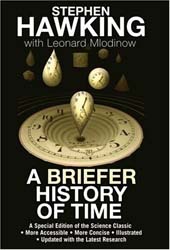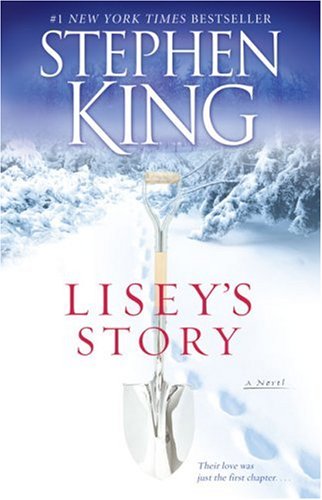That is good advice and makes a lot of sense. ![]()
I have decided to pick up where I left off, which is 2 pages in and still on letter ‘A’ on the ‘Oxford Dictionary of Philosophy’ - am feeling a need for some intelligent input you see.
Caring for Words in a Culture of Lies - Marilyn Chandler McEntyre
When I’ve received them…
Quantum Enigma- Physics Encounters Consciousness
quantumenigma.com/
Surely, Your Joking, Mr. Feynman!: Adventures of a Curious Character
craigr.com/books/surely.htm
The Black Hole Wars: My Battle with Stephen Hawking to make the World Safe for Quantum mechanics
blogs.discovermagazine.com/cosmi … -hole-war/
…and then perhaps on to some Kant. Any ideas of where to start with him?
Dharma Bums - Jack Kerouac
Nine Stories - J.D. Salinger
Tons of text books
http://www.amazon.com/India-History-John-Keay/dp/0802137970
India a History.
Arc - those books look verry interesting… Let me know how they turn out.
Always the very last sentence of any book he’s written. Then return it imediately to the library, or give to someone you don’t like.
I don’t like to read books that often but these days i am reading Harry Potter series . I have seen movies but haven’t read the books at all. So decided to see what’s the difference between two. I am on 1st part now.
Ringworld (1970) by Larry Niven

It is part of the inspiration behind the Halo video game series. Dead in the middle of the book, right now. Pretty good if you enjoy sci-fi. Lots of cool concepts and ideas - that may be relevant to the future of mankind.


I am reading Foucault’s Pendulum by Umberto Eco.
The Grand Design by Stephen Hawking
This is a great book.
I remember someone writing: [i]Eco is a philosopher, and he’s not afraid of creating funny myths as long as they have an inner beauty. Which doesn’t prevent him from doing serious research [although I do agree with him when he says he’s nothing but a ‘nebulous philosopher’].
Instead of complaining ad nauseam, people should take the initiative. Instead of reading books, they should WRITE books.
This is precisely what Umberto Eco did. His book Foucault’s Pendulum is more than a brilliant persiflage or learned caricature, more than a mere reductio ad absurdum: it’s a sequel to his first novel The Name of the Rose, which is concerned with the subversive power of laughter and comedy. Eco is well aware of what Enlightenment is all about. He, not unlike the serene Condorcet, is not afraid of playing the game. Bad philosopher, excellent satirist – and deep thinker, this Professor Eco.[/i]
As for me, when I was reading Foucault’s Pendulum, I thought it a very intelligent and intellectual esoteric mystery thriller about the secret of the Knights Templar, a secret that could mean a new form of energy and control of the world… hehe. It’s a ripping good yarn, as they say! What’s most unusual about this book is the role taken by the Jesuits… I never expected that turn at all…
I felt that this was the best book I had read in years… just excellent in every way imaginable… and surprising. From the content and tone of the first part… VERY scholarly, intellectual, historical, and serious, yet still driven by a great plot device… I was very surprised to see the narrative tone shift, gradually, to a kind of parody and a kind of unreliable revealing of the other narrator whose files he is reading. In a way, this lets the reader off the hook when trying to make real sense out of the whole thing, trying to figure out what’s actually historical or believable. We know there’s some actual history and real people in the book, but the FP narrator gives us several scenarios as possibilities, some of which are proven to be false in the book itself and some which are clearly false anyway… to the point that one just doesn’t care any more what’s true or not. It’s the possibilities that are so fascinating, and they are amazing and extremely interesting. Just the idea that Hitler became what he was, decided to target Jews, and chose which places to invade and/or occupy, based on a secret plan that would reveal the place of a new energy source that would enable him to control the world… well… And then the description of the Moslem sects and how they arose and why, and how the Assassins were formed and manipulated, fit right into the same picture. And then there’s the role of the Jesuits… most elucidating… and the sudden switcheroo from attributing the holders of the secret to the Jews because of their cabala to a reversion back to the neo-Templars with Jesuits in the mix. It looks like Hitler went after the supposed Jewish secret for nothing… a tragedy of enormous dimensions… but the whole thing was, over six hundred years and world wide. But Eco makes it bearable, entertaining, even funny sometimes with all the parodies of different kinds of fiction and non fiction. Just the parodic Conrad theme (Seven Seas Jim) is worth reading the whole book for, and then there’s the parody of Hugo that’s just priceless. I just can’t praise this book highly enough…
I am reading “The Picture Of Dorian Gray”, by Oscar Wilde.
And i am quite fascinated by it. In love with it, too.
I read the book a little while ago. I thoroughly enjoyed it. It makes one really stop to think when it comes to how we are capable of influencing people and the effect that that can have on another’s life. Sometimes it’s best to allow others to make their own decisions even when we are really capable of pointing out to them as many outcomes as possible. Also the negative and painful impact that vanity at its very worse can have on a person’s life and those surrounding them - how it can impact their life. To put it mildly. I just watched the up-to-date movie video this weekend which was okay but it barely began to portray Dorian’s narcissism and vanity. The book is like a really indepth study of pathologicall narcissism, vanity and arrogant. What disburbs us can also teach us. I loved it.
Enjoy it.
Yeah, Foucault’s Pendulum is one of my faves too, for pretty much all the reasons Jonquil covered.
Dostoyevski’s The Idiot
Hey where else could I find these so called horror books?
Do you have any recommendations?
[size=150]The Story of Philosophy[/size]
The Lives and Opinions of The Greater Philosophers
Will Durant
(just working my way backwards) ![]()
Y’all are all reading some cool reads… especially this little number - love sci-fi, so might check out the intro on it and see ![]()
Well… whilst at the top of our mile-long high-street this afternoon I stopped by a new(ish) ‘Book Warehouse’ to see what they got, and they had a nice little section on The Classics (which covered fiction, psychology, spirituality, philosophy, etc.) so I bought a copy of ‘The Art of War’ and ‘Machiavelli, The Prince’ and a very very large pencil with a very very big pencil-sharpener attached… all for £7.48, the giant pencil only being 49p.
I haven’t read a book in years, as hadn’t found anything that caught my interest enough to read, so I look forward to reading these, and more…
Magsj,
[size=150]CELEBRATE GOOD TIMES, C’MON[/size]!!! ![]()
![]()
Hi Magsjy ![]() How have you possibly survived without reading, Magsjy?
How have you possibly survived without reading, Magsjy? ![]() I mean, ah, reading takes us to the heights and to the depths of ourselves.
I mean, ah, reading takes us to the heights and to the depths of ourselves.
![]()
![]()
![]()
![]()
![]()
![]()
![]()
![]()
![]()
![]()
![]()
![]()
[size=150]READ ON!!![/size]
"Reading makes immigrants of us all. It takes us away from home, but more important, it finds homes for us everywhere.”
Jean Rhys
"To read is to fly: it is to soar to a point of vantage which gives a view over wide terrains of history, human variety, ideas, shared experience and the fruits of many inquiries.”
A C Grayling, Financial Times (in a review of A History of Reading by Alberto Manguel)
"Every reader finds himself. The writer’s work is merely a kind of optical instrument that makes it possible for the reader to discern what, without this book, he would perhaps never have seen in himself.”
Marcel Proust
"To learn to read is to light a fire; every syllable that is spelled out is a spark.”
Victor Hugo
Ah, I could go on and on…but that’s enough. ![]()
![]()
![]()
![]()